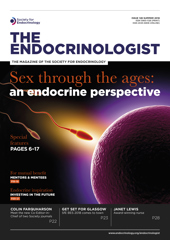Professor Colin Farquharson (Edinburgh) was recently appointed Co-Editor-in-Chief of two of the Society’s journals: Journal of Endocrinology (JOE) and Journal of Molecular Endocrinology (JME). Based at the University of Edinburgh–Roslin Institute, his research focuses on the fundamental cellular mechanisms underpinning bone and cartilage growth, development and function. We spoke to Professor Farquharson about his new appointment, his work with the Society and his research.
WHAT INSPIRED YOU TO GET INVOLVED IN ENDOCRINOLOGY AND BONE RESEARCH?
I was introduced to bone research during my PhD, back in the late 1980s, in Aberdeen, where I investigated the effects of copper deficiency on collagen in the skeleton and cardiovascular system. However, I was really inspired during my first postdoctoral position with Nigel Loveridge, who introduced me to the growth hormone/insulin-like growth factor-1 (GH/IGF-1) axis, and its control of endochondral ossification and skeletal development. This interest has stayed with me throughout my career.
WHAT ARE YOUR CURRENT RESEARCH INTERESTS?
My main interest is the GH/IGF-1 axis and its effects on bone formation and endochondral growth, and how disease states such as chronic kidney disease, muscular dystrophy and inflammatory bowel disease affect bone development and turnover. The mechanisms of skeletal mineralisation and, in particular, the role of phosphatases are also an ongoing research interest.
I think there is potential to harness the power of the GH/IGF-1 axis to prevent growth retardation and bone loss in a variety of genetic and inflammatory diseases.
HOW DO YOU FEEL ABOUT YOUR NEW ROLE AS CO-EDITOR-IN-CHIEF OF JOE/JME?
I am excited by the ability to contribute to the success and direction of two journals that are established leaders in publishing basic endocrine research. Whilst this is a position of great responsibility, it is also a great opportunity to work with talented senior editors and a dedicated publishing team, who collaborate effectively to ensure the highest quality research is published in both journals.
WHAT WAS IT LIKE BEING A SOCIETY FOR ENDOCRINOLOGY ENDOCRINE NETWORK CONVENOR?
The Bone and Calcium Endocrine Network (BACN) provided a forum to bring like-minded basic and clinical researchers together and encourage cross-disciplinary research. Specifically, the BACN enabled Society members with an interest in skeletal physiology and metabolic bone disease to come together, share research ideas and best clinical practice, and to find solutions to the challenges they face. It was a pleasure to work with Duncan Bassett as the first joint convenors of the BACN, to help make this happen.
WHAT ARE THE BIGGEST CHALLENGES IN YOUR RESEARCH FIELD RIGHT NOW?
In common with many other research fields, obtaining sufficient research funding to support our research ideas continues to be an enormous challenge. Many excellent grant applications (as observed through the peer review system) are not funded. Rather gloomily, this situation is unlikely to change in the near future.
WHAT DO YOU THINK WILL BE THE NEXT BIG BREAKTHROUGH IN YOUR FIELD?
It’s impossible to predict, but it is imperative and timely that regulatory mechanisms are defined and applied in new strategies to therapeutically control joint disease in osteoarthritis. Existing treatment programmes for osteoarthritis are extremely limited and centre on pain management. This lamentable situation is partly due to our incomplete understanding of the mechanisms by which cartilage and bone changes develop in osteoarthritis. I hope that ongoing and future scientific enquiry, which may involve an endocrine component, will help in this goal.
DO YOU HAVE WORDS OF WISDOM FOR ASPIRING ENDOCRINOLOGY RESEARCHERS?
Some of my proudest professional experiences have involved the opportunity to guide and advise young scientists and to see them develop into fully fledged independent research scientists. Two thoughts come to mind: (a) Follow your ideas, publish your results and, most importantly, enjoy the exciting opportunities and new friendships afforded by a career in scientific research. (b) Stick at it and don’t give up through the hard times, especially when funding is precarious!







